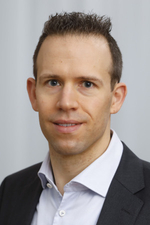Financial economist Alexander Hillert has taken up a professorship in Finance and Data Science at the Leibniz Institute for Financial Research SAFE on 1 December 2021. In this position, he will also take over the program direction of SAFE’s Research Data Center from SAFE board member Uwe Walz. “SAFE combines the diversity of scientific methods under one roof and is consistently pursuing this path by linking finance and data science. I am very much looking forward to being part of this development and helping to build a comprehensive European database for financial research,” says Hillert.
“With Alexander Hillert, we are gaining an excellent specialist who, with his expertise, will make a significant contribution to shaping the profile of our institute,” says SAFE Director Jan Pieter Krahnen. “I am therefore extremely pleased that we can strengthen our team with him.” From the end of 2016 until November 2021, Hillert held the professorship of Sustainable Asset Management at the House of Finance at Goethe University Frankfurt before joining SAFE. He received his Ph.D. from the Graduate School of Economic and Social Sciences at the University of Mannheim.
Research focus on asset pricing, corporate finance, and behavioral finance
Alexander Hillert’s research focuses on asset pricing, corporate finance, and behavioral finance. A central question of his research is how capital market participants process and interpret information. He uses analytical methods from computational linguistics to systematically investigate the influence of text-based information on capital markets. His work has appeared in internationally renowned academic journals such as the Journal of Financial Economics and the Review of Financial Studies.
Alexander Hillert has been involved in the training of young academics for many years, including in the doctoral program of the German Academic Association of Business Research (“Verband der Hochschullehrer für Betriebswirtschaftslehre”, VHB). Moreover, he teaches not only at Goethe University Frankfurt but also other leading research institutions such as the University of Mannheim, WHU – Otto Beisheim School of Management, and the Karlsruhe Institute of Technology (KIT).
About his goals as coordinator of the SAFE Research Data Center, Hillert says: “One of my central goals is to provide comprehensive training for our young researchers in terms of analytical methods and to support them in research projects by providing them with new, especially European, data sets. In recent years, we observe a strong trend in leading journals towards using unstructured data in conjunction with innovative analysis methods such as machine learning. Against this background, the methodological and data expertise of our early career researchers is an important building block for SAFE’s future publication success.”
Scientific contact


